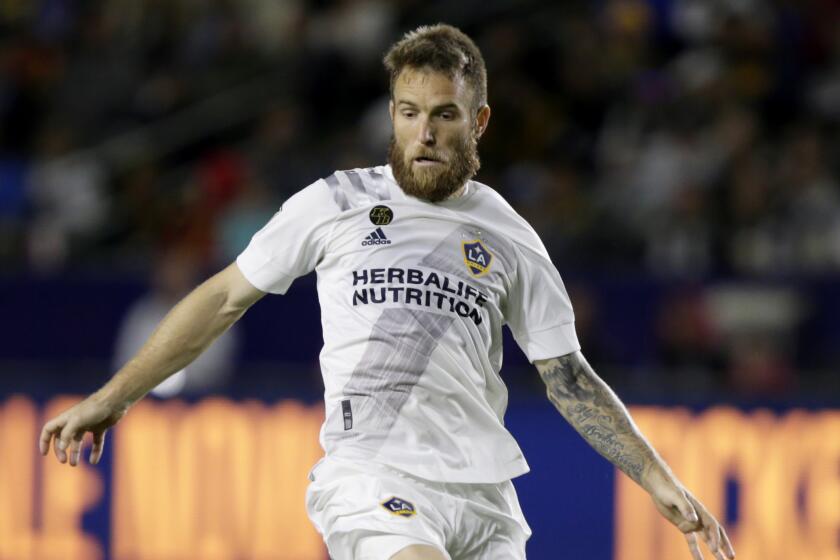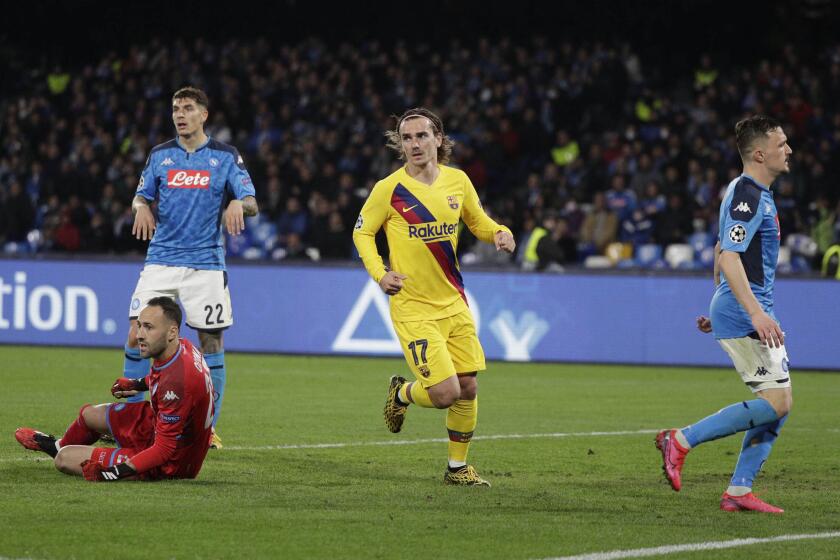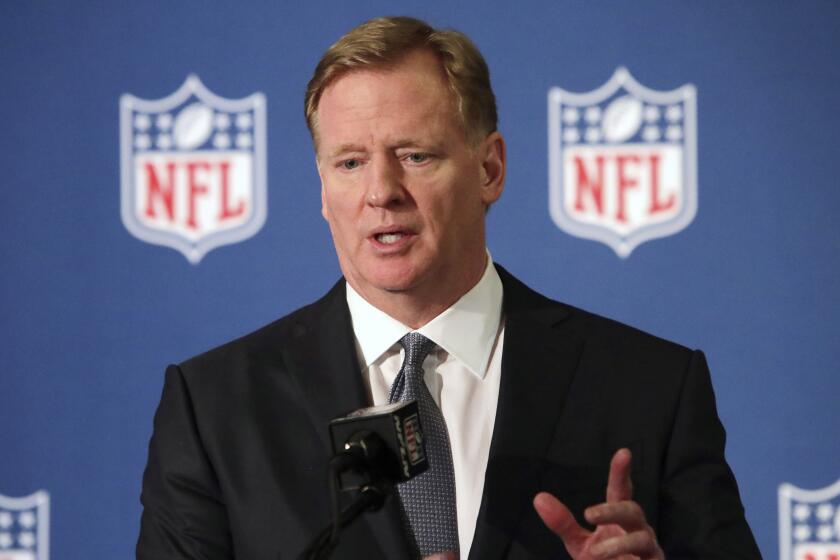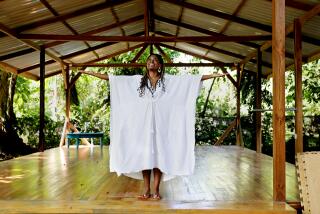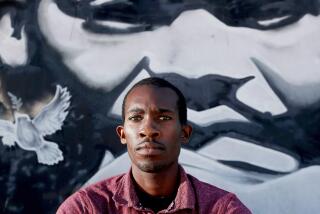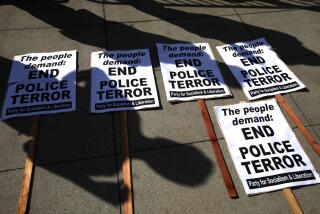MLS players Nedum Onuoha and Mark-Anthony Kaye discuss their own racism experiences
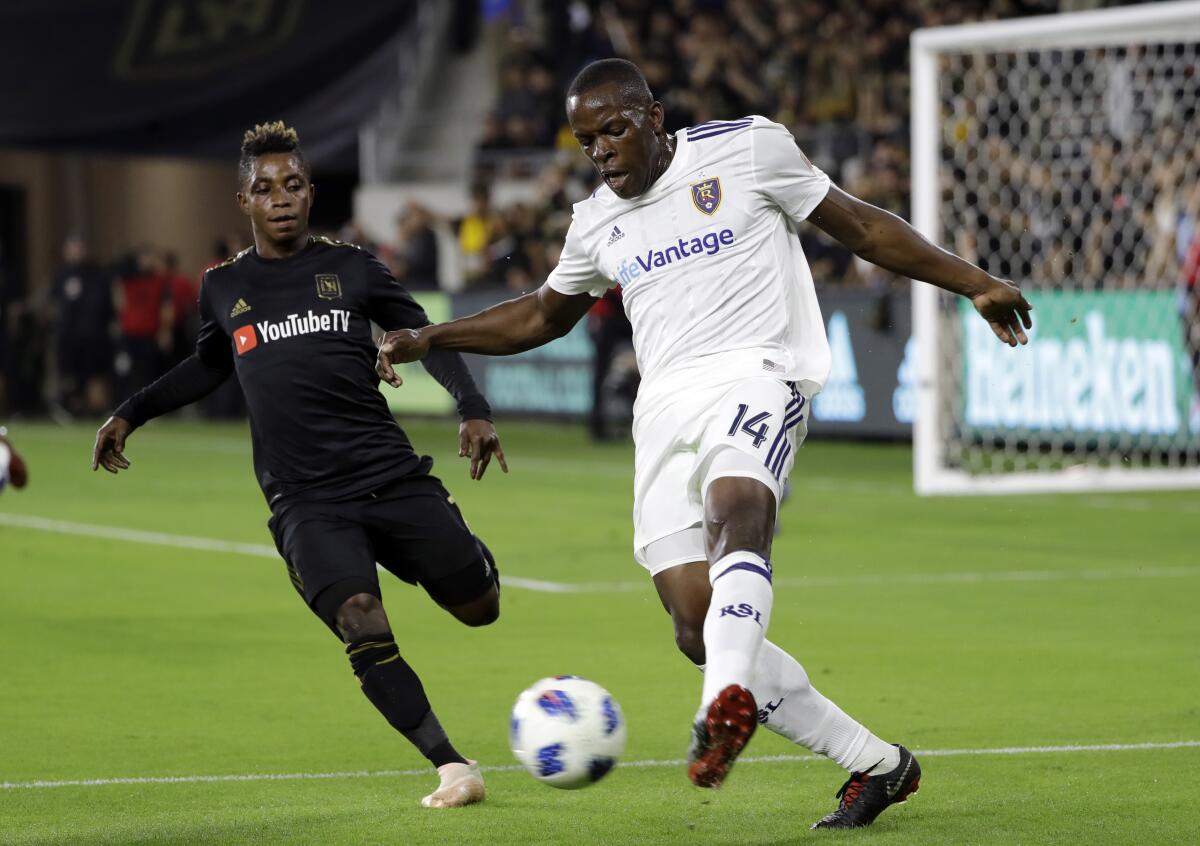
- Share via
The first time he watched the horrifying video of George Floyd’s death on a Minneapolis street corner, Nedum Onuoha saw more than just a police officer kneeling on the neck of an unarmed black man. He saw more than the asphyxiation of someone who repeatedly called out ,“I can’t breathe!”
Like many black men he also saw himself slowly dying, face down on the asphalt.
“Looking at George Floyd, I realized that is me,” Onuoha said. “That was terrifying.”
Which is when Onuoha said he began to cry.
“I don’t really cry about anything,” he said. “But in that moment, I can’t cope.”
Mark-Anthony Kaye watched the video and saw the same thing.
“It opened the reality that yeah, in some situations that could be me,” he said. “It’s just an ongoing stigma that’s placed on the black community. If you’re not someone of mass importance, you’re not important. And it’s not right.”
Onuoha and Kaye share more than a fear of police brutality so extreme that it has led to days of protests and thousands of arrests across the country. Both are professional soccer players, Onuoha a defender with Real Salt Lake and Kaye a midfielder with LAFC. And neither grew up in the U.S.
Onuoha, 33, was born in Nigeria and raised in England, where he played 10 seasons in the Premier League before coming to MLS three years ago. Kaye, 25, is Canadian and a member of the national team before becoming an MLS all-star. Those backgrounds have given both men a fresh if frightening take on what it means to be black in the U.S., perspectives that have been heightened by Floyd’s death in police custody two weeks ago.
“There’s something about being black in America. There’s something about being a black male in America,” Onuoha said.
“I believe I’m a good person. But multiple times in my life I’ve been treated like I’m not,” he added. “And the reason for that would be just the pigmentation of my skin.”
The Galaxy released Aleksandar Katai after learning the midfielder’s wife posted racist comments to social media in the wake of George Floyd’s death.
Onuoha says he’s torn because his experience in the U.S has generally been a good one. He frequently vacationed here and wouldn’t have come to MLS, which paid him $504,000 last season, if he didn’t feel comfortable. But he also has a clear-eyed view of his adopted home.
“As much as this country has lots of massive positives, the fact that that can happen in this day and age is a huge negative,” he said of Floyd‘s death. “It just felt like something left me. I’m still fed up. That was the final straw. I’m done.
“My approach toward this now is probably going to be very different going forward.”
Gregarious and thoughtful, Onuoha is popular with teammates and RSL club employees, a leader who spearheaded an effort to collect money for workers furloughed or laid off because of COVID-19, sending many of them checks drawn from his personal account. Back home in Manchester, England, walking down a city block with Onuoha can take most of an afternoon since he insists on greeting everyone he passes.
Looking at George Floyd, I realized that is me. That was terrifying
— Real Salt Lake player Nedum Onuoha
That’s often not the case here.
“Some people see me walking down the street and they’ll cross over to the other side,” he said.
“I don’t want to sound negative. I’ve not lost my life. But I’ve been treated differently because of what I look like.”
Onuoha experienced racism in the U.K., of course. He says it’s followed him everywhere he’s gone, but he rarely feared for his life in England. In the last four months in the U.S., on the other hand, Floyd’s death, the February fatal shooting of unarmed jogger Ahmaud Arbery in Georgia and the March police killing of EMT worker Breonna Taylor in her Kentucky home have left him wary and disillusioned, he said.
Barcelona soccer player Antoine Griezmann says he wants to finish his playing career in the MLS.
“When I’m in the U.K., I feel more comfortable that [it’s] not going to get to a point where it’s going to become violent or deadly. Over here, I just don’t feel as comfortable because everyone has the right to have a weapon,” said Onuoha, who admits he fears the police in the U.S.
“If I walk into the wrong person or the wrong situation, this could become deadly for me. It’s just something I’ve gotten used to, which is a shame, really.”
Another factor, Onuoha says, is the “fear of other” that politicians and the media exploit to make immigrants and other people of color seem dangerous.
“For a lot of people those fears manifest themselves in how they believe me to be. Sometimes people perceive me to be a threat the first time they see me,” he said. “So when someone sees the police, the police are there to protect them from what they fear.
“But as a black male in America, what are the police there to protect me against?”
Am I supposed to wear my jersey all the time so people know who I am? That’s not right.
— LAFC player Mark-Anthony Kaye
Kaye concedes the differences in racial attitudes between where he grew up in Toronto and where he now lives in Los Angeles are minor. He, too, experienced racism long before he came to the U.S.
“There’s racial injustice everywhere,” he said.
Kaye says the atmosphere here is now “toxic” and admits he has grown tired of a double standard in which people cheer him when he’s on a playing field but discriminate against him when he’s not.
“On the street, I’m a normal black guy. I see the way people look at me. Because they just see color, that’s their first inclination. And it’s wrong,” he said.
“Am I supposed to wear my jersey all the time so people know who I am? That’s not right.”
Kaye said he also fears the police because he believes they enjoy unchecked power and little oversight, an opinion he backs by reciting numerous cases of unpunished police violence captured on video in the last week. But like his girlfriend, who was born in Santa Cruz, Kaye also likes living in the U.S.
He just wants the country to live up to its promises.
NFL Commissioner Roger Goodell says the league was wrong for not listening to players fighting for racial equality and encourages them to peacefully protest.
“People are always saying how great the country is. And I believe at a time this county was great,” he said. “But there’s a lot of times this country wasn’t great. When a lot of your population has to live in fear every day, your country is not the best in the world.
“Change needs to happen. It’s that simple.”
Change won’t happen on its own, though, which is why Kaye, who attended several protest marches last week, says it’s time for people of all races to make their voices heard.
“We all have a circle of influence,” he said. “Whether you can reach 10,000 people or 10 people, if you’re not taking responsibility to use your ability to talk to people, then you’re part of the problem, not the solution. A majority of this country are just bystanders because it doesn’t affect them. If you want to sit on the sidelines it doesn’t help. We need to win this game with everyone.
“No more silence. Silence does not help. It makes it worse.”

